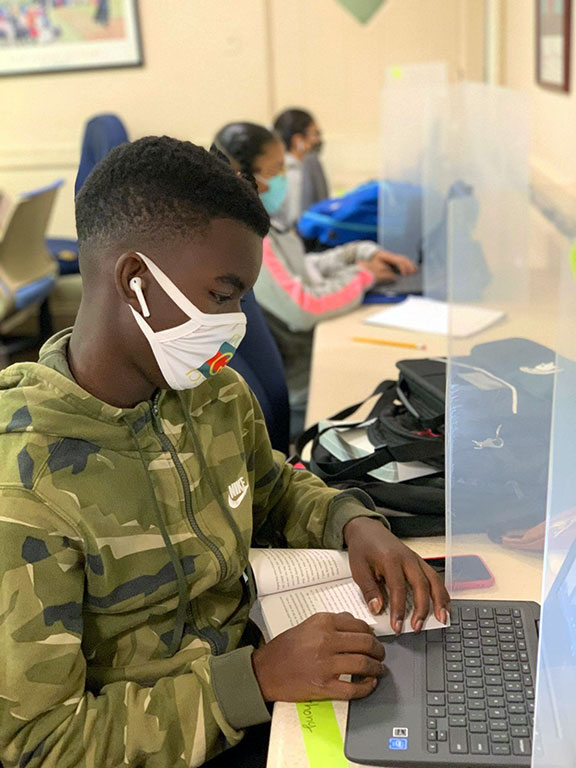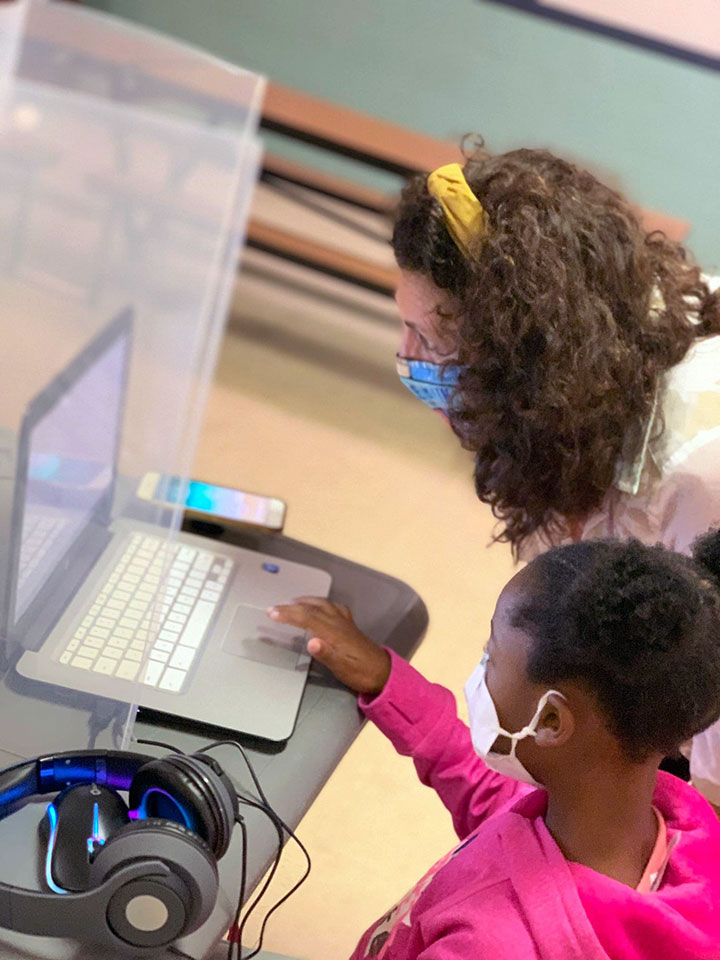News from the Field: Jones Center 21st CCLC Supports Students in Person and Online
Like 21st CCLC programs across the country, the Harold Colbert Jones Memorial Community Center (Jones Center) 21st CCLC program in Chicago Heights has changed its afterschool programming as schools and communities continue to adapt to the COVID-19 pandemic. The 21st CCLC has offered online programming, modified in-person programming, and collaborated with schools and other projects to continue providing the supportive environment and academic enrichment that students need.
Because of the quick transition to online programming in the spring, the Jones Center team focused on outreach and supports for families for the remaining semester, recognizing that students, their families, and staff were all adapting to virtual learning. By June, the 21st CCLC was prepared to offer two four-week summer programs, the first entirely online, the second in-person and online, depending on student and family preference.
 |
|
|
Students complete school work at computer stations at the Jones Center headquarters. |
The first summer session included a combination of synchronous, or real-time, and pre-recorded activities like cooking classes and STEM (science, technology, engineering, and mathematics) projects. The summer program also offered “camp in a box,” where every Monday, students received a box of materials for the week’s hands-on camp projects. One week, students received supplies to grow grass in an eggshell. Another week, materials included a shower curtain playing board and colored discs for a life-size game of tic-tac-toe. Students had opportunities to participate and share their work online, but they could also complete the activities with their families if they were unable to join the virtual sessions.
Executive Director Cheryl Roop says that identifying staff strengths and interests helped make their first all-virtual summer program a success. “Some people felt comfortable facilitating activities virtually,” says Roop. “Other people liked to pre-record a presentation so they could get it exactly the way they wanted it.” Roop adds that staff who were not as comfortable with technology would play a supporting role in online sessions and helped assemble and deliver the materials that were prepared for students each week. The Jones Center team also found that it was essential to have multiple staff members involved in each virtual session to provide technical support, measure and manage student engagement, and take over if a presenter had internet problems. The Jones Center's newsletter shared pictures of the various activities and helped maintain a sense of community.
In July, the Jones Center 21st CCLC began offering both in-person and virtual programming. The decision to offer in-person programming was based on the recognition that many parents had to go to work, and students needed a safe place to be. Staff used the time between the two summer sessions to ensure measures were in place to follow state and local health guidelines for in-person activities and to continue refining virtual programming. To support social distancing, students received individual bags of school and art supplies, and the 21st CCLC team took advantage of the nice weather to spend as much time outside as possible. There were also programming changes. “We couldn’t have field trips this year,” says Roop, “so we started asking ourselves and brainstorming, ‘what can we do to make this fun for kids?’” The 21st CCLC brought in community members for activities like making tie-dye t-shirts, which was a hit with students. To stay safe, staff and students had to learn new routines, but, Roop says, “with a little coaxing, . . . the kids did really well. They were just so happy to be out and about.”
 |
|
|
A student and teacher review an assignment after in-person programming was reinstated midsummer. |
When school began in the fall, Jones Center 21st CCLC continued to operate a hybrid of in-person and online programming, with families selecting one of the two options. Because the Chicago Heights School District that the 21st CCLC serves will be offering only remote instruction until early November, the 21st CCLC is hosting programming in its building instead of at the schools. The program hires school staff as part of its 21st CCLC team, which has helped maintain communication with the school.
In addition to the important academic support, the 21st CCLC also provides an environment to address students’ social and emotional needs. Whether students’ families have been directly affected by COVID-19 or simply the economic impact and social isolation, the afterschool program provides supporting relationships where students can share their feelings. The 21st CCLC also partners with two organizations that provide social work and mental health services to work with students who need more intensive support.
As the Jones Center 21st CCLC team prepared for programming this summer, team members also took time to process how local and national events were affecting them. The first planning session occurred shortly after the police killing of George Floyd and the subsequent protests. “We spent one whole day just getting all of our feelings, backgrounds, and experiences out there before we even got into any content,” says Roop. The conversation did not end after the first day, and it helped the staff provide the support that students needed.
Preparing for the transition to virtual programming and then a hybrid afterschool model required a willingness to take on new challenges and a commitment to reflecting and refining as the program progressed. In recent months, 21st CCLC programs have been planning amid increased uncertainty and trying to navigate a nearly overwhelming amount of resources. Different team members took responsibility for different parts of the virtual program at the Jones Center, with colleagues there to support. “Some activities worked, and others didn’t,” says Roop, “but we knew we could evaluate and improve.”
During the summer, some parents sent texts and photos of their children participating in virtual programming. “The parents were excited that we were providing activities,” says Roop, “and the students were excited to come back.”